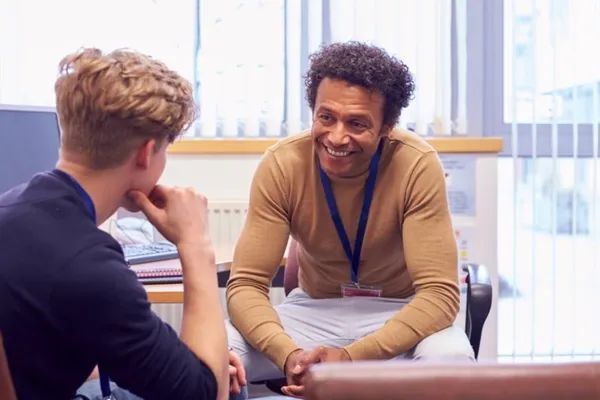The ‘Emotionally Available Adult’ (EAA) has become a common concept in the world of Emotional Wellbeing, Mental Health, and Trauma Informed Practice. However, we often talk about its importance without fully explaining what it means and how to implement it within an underfunded system that faces multiple competing demands.

Support from an Emotionally Available Adult (EAA) can come from different sources. However, it's important to note that not just any adult can fulfil this role. The essential qualities and characteristics required to provide appropriate support are more important than the person's professional title.
The role of an EAA can be taken on by various individuals, including extended family members, professionals like youth workers, and, of course, teachers and school staff.
To start, let's define an Emotionally Available Adult (EAA) as someone with specific key traits who is 'On Tap'. They possess three key qualities, which are:
Present.
Approachable, Attentive, Available, Engaged, Interactive, Involved, Reliable and Responsive
Emotionally Available
Authentic, Caring, Empathetic, Nurturing, Sensitive, Supportive, Understanding, and Warm
Functional
An Advisor, Coach, Confidant, Inspirer and Listener
The significance of time and consistency in the role of an emotionally available adult cannot be overstated, as this allows them to build trust and form meaningful, supportive relationships.
- Time, both in the moment and in terms of long-term engagement allows these adults to provide stability, guidance, and unconditional support, which are crucial for the emotional and developmental well-being of children and young people, especially those who have experienced adversity.
- Consistency helps young people feel valued and secure, fostering a sense of trust and belonging that is essential for their growth and resilience. Recent research has shown that building long-term relationships with one trusted adult is more effective than having sequential relationships with different adults. However, having sequential relationships is still more beneficial than having no adult support at all.
So, What’s the impact?
Numerous studies have found that support from a trusted adult reduces harmful outcomes for children and young people who have faced adversity. Although adverse childhood experiences (ACEs) can negatively impact mental and physical health throughout a person’s life, these effects can be substantially mitigated by having a trusted adult during childhood. Conversely, multiple health-harming behaviours and lower mental well-being also increase significantly with a higher ACE count and lack of trusted adult support in childhood.
More than all of the above, these trusted relationships support participation and contribution, competence, belonging and hope. These are fundamental to the development of meaning in children’s lives.
The evidence base also clearly shows that these benefits are not just long-term but also contemporaneous—you will see, and your child will feel the benefit now!
What does this mean for schools?
1. Importance of Trusted Adult Support
A number of studies indicate that having a trusted adult reduces harmful outcomes for children facing adversity. For schools, this means that fostering strong, supportive relationships between students and staff can positively impact both current well-being and future outcomes. Interventions that connect students with trusted adults—be they teachers, teaching assistants, volunteers, or mentors—can make an immediate and lasting difference.
2. Core Qualities of Trusted Adults
Trusted adults exhibit qualities such as warmth, empathy, and genuineness. School staff can be trained to develop these qualities, ensuring that students feel understood and supported. Programs that emphasise emotional intelligence and relationship-building can enhance the ability of teachers and other school staff to connect with students effectively.
3. Building Trust Over Time
Building trust requires consistency and time, which can be challenging in any school, but is especially true in those with higher staff turnover. However, maintaining stable relationships is crucial. Schools should strive to minimise changes in key staff and foster long-term connections. For instance, mentorship programs where a teacher or teaching assistant works with the same group of students over several years can help build deeper, trust-based relationships.
Recent research has demonstrated that such EAA relationships are more effective when provided with continuity rather than in serial ways—in other words, it is better to have a long-established relationship with one trusted adult than with one after another, although this, too, will have more value than having none at all.
4. Trusted Adults from Various Sources
Support can come from various adults within the school community, including teachers, coaches, and administrative staff. Schools can develop a network of trusted adults by identifying and training individuals who can provide consistent, supportive relationships. Engaging with community organisations and parents to create a broader support system can also be beneficial.
5. Advocacy and Connection
Teachers and their assistants can play a pivotal role in advocating for students and connecting them with supportive adults. This might involve identifying individuals in the student’s extended network who can serve as trusted figures or partnering with local organisations to provide additional support. Schools can facilitate these connections through structured programs and regular check-ins to ensure ongoing support.
